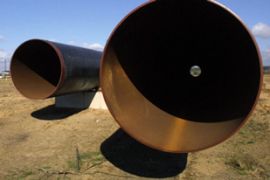Ukraine threatens Russia gas supply
Energy supplies to Europe under threat amid debt dispute between Kiev and Moscow.

Financial problems
Gazprom supplies a quarter of the gas used by EU nations, with around 80 per cent of it passing through Ukraine.
A seizure of supplies would raise fears of disruptions in supplies to Europe similar to those which occurred in January 2006.
Neave Barker, Al Jazeera’s correspondent in Moscow, said: “Ukraine says it has learnt from a similar gas dispute with Russia three years ago and now has enough stockpiles to last a few months.
“But Kiev is finding itself under pressure from the West not to threaten European supplies as Russia continues to demand all expenses be paid”.
Paying the debt, plus a proposed Russian increase in tariffs, is likely to prove extremely difficult for Ukraine which was recently forced to seek $14.5bn in aid from the International Monetary Fund.
In addition to the global financial crisis, the country is also suffering from political turmoil amid a long-standing feud between Victor Yushenko, Ukraine’s president and Yulia Timoshenko, the country’s prime minister.
Some media reports suggested that Timoshenko may go to Moscow for talks to resolve the gas dispute.
Russia’s ties with its former Soviet neighbour are already badly strained over Ukraine’s aspirations to join Nato and Kiev’s support for Georgia in its August war with Russia.
On Tuesday, Gazprom had said it would stop gas shipments to Ukraine if it failed to pay the debt by New Year’s Eve.
In a televised statement, Alexei Miller, Gazprom chief executive, said: “The countdown has started. If Ukraine doesn’t pay off the debt by December 31, Gazprom will have no grounds to continue shipping gas to Ukraine.”
Miller said Ukraine would also face sharply higher payments for future deliveries if it did not act.
Ukraine currently pays Russia $179.5 for 1,000 cubic metres of gas but Gazprom has warned that prices could rise to $400 from next year.